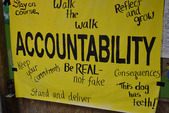Imagemakers International
|
We are living in a 24/7 world and work is becoming home and home is becoming work. As the boundary that separates these two worlds quickly disappears, we are losing sight of who we are, what really matters and what is important to us. If we are to keep the human spirit alive, then we must change the way we are living and we must achieve some sense of balance. Our self-image and ultimately, the quality of the life we lead, depends on it.
So what exactly do I mean by balance? Balance as we define it, is simply about living your life in alignment with your values, integrating your priorities and making time for the people and things, that matter most to you. In this respect, balance is uniquely defined by each and every person. However you define it, it is about self-leadership - something we all must strive for if we are to know what peace of mind is all about. The following ten steps may help you along the way: 1. Clarify your values. Take the time to ask yourself, two very key questions: Who am I? and What do I stand for? Your responses should define and reflect your core values and those core values should be integrated within every area of your life. If for example, respect and compassion are two of your core values, you have to ensure that those values are shared with your family, your colleagues and your clients. Failure to do so, will diminish your self-respect and that in turn, will diminish your ability to focus in the workplace. 2. Identify your priorities. What is important to you - is it your health, family, friends, creativity, alone time, spirituality, personal development, community or your work? Write down everything that really matters to you in your life and schedule your time accordingly. Setting priorities will help you establish manageable boundaries that will allow you to achieve more balance in your life, overall. 3. Be committed to a healthy lifestyle. Recognize that your health is your most valuable possession. We often take our health for granted until we receive a wake-up call. Invest in yourself by exercising a minimum of three to four times a week. Eat a healthy, balanced diet and drink plenty of water. A healthy lifestyle will reduce stress and provides you with more energy and an enhanced sense of well-being. In turn, you project your self-respect to the outside world and this translates into a positive attitude, stronger communication skills and better results, for you. 4. Make time to create wonderful memories with your family and friends. When your personal life is rich, you create synergy in every area of your life. When we are in balance with our primary relationships, it spills into every other relationship in our lives. Most importantly, you will have the peace of mind that will allow you to be happier and more effective in the workplace. 5. Identify any unresolved conflicts that you may have in your life. Though you may not realize it, unresolved conflicts will impact how you communicate with others and as well, hold you back from reaching your full potential. By taking responsibility for the role that you play in the conflict and by doing everything you can do to resolve it, peace of mind will not elude you. Recognize too, that the person you have the conflict with, may not be willing to look at it in which case, "the responsibility lies with the person who understands[1]." You must be willing to forgive and move on. 6) Give back. Take the time to make a difference in someone else's life. By reaching beyond ourselves to help others, we ignite the human spirit and in turn, add a greater sense of meaning and purpose to our daily lives. Think about how you may be able to help a colleague by sharing your experience and knowledge. Your giving will come back to you, tenfold. 7) Be committed to reaching your full potential. Ask yourself what skills you need to enhance your credibility at work. What courses do you need to take? Are you presenting yourself in a way that commands respect? Do you treat everyone you meet with the same level of respect that you have for yourself? These are very important questions that when addressed, will have a profound impact on your personal and professional success. 8) Create a vision for your life. Michelangelo was once asked how it was that he created a magnificent angel from a huge slab of marble and he replied, "It's really quite easy, I simply have a vision and I just chip away at everything that isn't angel." Having a vision for your life is about creating a mental picture of everything you would like to achieve in the future. When coaching our clients, we suggest that they project their lives ten years out, but that they write their vision, in the present tense. A written vision, though not cast in stone, engages the entire nervous system and inspires you to do the things and to set the goals that will make it a reality. 9) Set realistic and meaningful goals. Your goals are the stepping stones toward your vision - they are your navigational tools that will take you to a specific destination in the future. In order to be inspired, your goals should begin with a verb and be specific and measurable. If one of your goals is to get fit and healthy, "get fit", is not a goal because it is not specific and it is not measurable. Instead, begin with "exercise three times a week, beginning July1, 2015." And just watch what happens. 10) Treat everyone, including yourself, with respect. Respect as we see it, is the glue that holds people, relationships, families and companies, together. When we respect ourselves and others, we influence the trust that we have for one another. When people feel respected, which is a basic human need, they are able to respond to one another in the same way. Take the initiative and lead by example - you'll be amazed at the results and you will inspire others to emulate you. In closing, remember that we all deserve to bear the fruit and reap the rewards of our hard earned efforts. What makes it all worthwhile, however, is the knowledge of knowing that we have taken the time to integrate our priorities into our daily life. After all most people don't regret what they did do, they regret what they didn't do. So with that thought in mind, recognize that balance is not simply something that you squeeze in when you have some downtime. Instead, it is a way of living that expresses your values and reflects your true identity and that is what gives meaning and purpose to your life. So why not take a leap of faith and consider incorporating these ten strategies into your life? If you do, you may not only reach your full potential, happiness, fulfillment and peace of mind, will not elude you. I wish you well on your journey. ©2015.Kimberley Richardson All rights reserved. [1] Frank Raso - Co-founder Imagemakers International "I'm not sitting across from her", I can remember her saying quietly, as she stood at the Christmas Dinner table. Recognizing the need to be comfortable, she quickly shifted her position so she wasn't forced to "look her in the eye", throughout the meal. Breathing a sigh of relief, she relaxed as did everyone else. Aaah the family Christmas Dinner. We can laugh at this scenario because - let's be real - we've all been there. It's the place we not only gather for a great meal, it's the place that unresolved conflicts seem to rear their lovely and not-so-pretty heads. Tension and stress often builds, well in advance, as we do our best to be "civil" to one another. How sad I often think, that the very relationships that are meant to support and elevate us, often bring us down. Holding our spirits captive and deprived of joy, not only at Christmas, but throughout our lives. Knowing this is something we have all faced and will face, what if we were to create a new tradition by giving the gift of forgiveness to ourselves and others? The Gift of ForgivenessWill you Give the Homeless a Home in your Heart this Christmas? I can remember our encounter like it was yesterday. He looked up at me timidly, afraid to look me in the eye. In a trembling voice he asked, "Spare any change, ma'am?" I responded, "I'm sorry Sir, I wish I could, but unfortunately I don't have any with me today." Smiling he said, "that's ok your acknowledgement is payment enough." With tears in my eyes, I walked away somewhat humbled by the gift he had given me. I made a mental note "to always carry some change" just in case I would see him or others in the same predicament, again. During the Holiday Season, as we run from one place to another, we will pass people like this man. Cold and hungry, they will persist in their request for change, asking one person after another. Many will walk by, some will reach into their pockets and a precious few, will reach into their hearts. Those who fall into the latter category will be giving the gift of acknowledgement - that priceless gift that is wrapped up in kindness and tied with dignity. We have many leadership lessons to learn from people who are presently homeless, not the least of which is humility. Here are a few more worth sharing: 1. Be compassionate: We must remember to not judge the homeless as "less than" or condemn them for being on the streets. There are stories upon stories of people whose lives were changed in an instant, by tragedy. People like the former executive of Shell Oil who's wife and daughters were killed in a car accident. People who through adversity and/or substance abuse, landed there. People who were just one paycheque away from losing their jobs and did. All of them with one thing in common, their humanity. Let's remember that, for one day it could be you. 2. Preserve their dignity: Though we've all heard stories about people who do choose to live on the streets, far too often mental illness re-located them there. With current stats of 1 out of 4 people suffering from mental illness, it's not surprising that those without a support system end up being homeless. We must strive to do our very best as human beings, to preserve their dignity and to treat them with respect. Those who do will be doubly rewarded. 3. Remember, there are great teachers and leaders amongst us: Closer to home, my Uncle was once an English teacher who taught at a very prestigious private boys school in Toronto. After a series of difficult life circumstances, mental illness and hard times, he ended up on the street. He went on to create Poetry Canada Review, a newspaper of the heart reporting on what really matters. It was also the first newspaper where Canadian poets could post and share their work. He also published three poetry books and won several international awards. Sometimes people must hit rock bottom before their gifts are discovered and they can then rise. And so, as we move forward with our gift buying, let's remember to have an open and humble heart. Let's remember that every one is somebody's child. Let's give of ourselves by taking the time to acknowledge those less fortunate than ourselves. Let's reach into our hearts and show others that they matter and in turn, honour our fellow man. If we do, we will not only lift their spirits we will elevate our own, not only at Christmas, but always. And then perhaps the next time someone asks us to: "spare any change?", we can take pride in knowing that we were in fact, the change. Fellow leaders amongst us. Lead with compassion. Make a difference. Leave a legacy. Leadership Presence: Do You Qualify?
Are you a Genuine Leader? If you want to attract and engage the best talent, improve performance and optimize results, it should come as no surprise that it all begins and ends with leadership. What may be surprising to many, however, is that leadership in the 21st Century is no longer just about rank, title or position. Instead, it's about knowing who you are, the values you uphold and the impact your actions will have on the lives of others. As we see it then, everyone has the opportunity to be a leader and the need for genuine leaders, has never been greater. To help people on that path, we’ve come up with a checklist that helps to define what a genuine leader is. Why not see how well you fare? A genuine leader is someone who:
So, are you a genuine leader? Take a moment to acknowledge the leadership qualities that are within you and those that you may need to work on. When you do, you will be well on your way to becoming a genuine leader and the kind of person others are inspired to emulate. ©2014 Kimberley Whiten-Richardson - Imagemakers International. All rights reserved. The passing of Robin Williams has evoked many feelings and sentiments and I find myself trying to understand why? I never knew him as a person, didn't follow him as a comic, but I do remember that when he entered my world as Mork, he made me laugh - a lot. And now, for many reasons, I am experiencing a deep sense of loss.
Like so many others, I've found myself searching for answers and wondering how a man with such extraordinary wit, brilliance, success and love, could leave this world as he did. Yes I know that I’m not the first to ask that question, but my desire to attempt to answer it for myself, is important. Over the past week, we've all come to hear about the deep and dark places his mind took him to. Places where he was left feeling alone, afraid, anxious and fearful. We’ve also learned that he suffered deeply from depression and was in the initial stages of Parkinson’s – a debilitating disease that impacts the nervous system and the mind, ultimately leaving the person incoherent and deprived of their essence. But why we ask, would he end his life? Aren't there other celebrities like Michael J. Fox, who turned their diagnosis into a triumph – increasing awareness, moving forward and inspiring research into this disease? Why couldn't he have done the same thing? Perhaps the answers lie in the fact that Robin's essence was his genius, wit and unquenchable desire to make people laugh. That was his raison d’etre. His reason to be. So maybe there is a possibility that the thought of no longer being able to be himself, was essentially life threatening to him. And before the disease would take him, he would claim his life so that "who he was" could and would, remain in tact. And now, everyone who knew him personally and those of us who didn't, have been forced into a state of reflection, grieving the loss of the joy, laughter and inspiration he gave us - remembering him just as he was. And remember him, we will. His passing has made me realize that one life can truly make a difference. His death has raised awareness of the power of depression and that no one is exempt. According to the America Foundation for Suicide Prevention, on the evening of Robin's death – they received the highest number of calls – in it's 27 year history. The upside to the downside of this tragic loss is that many lives were likely saved, awareness increased. Depression is a dark, dark place that its victims do not choose to venture to. It is almost always triggered in adolescence by the culmination of experiences, people and relationships that have left an indelible wound. Having being surrounded by this dark devil in my own family, I know for certain that people do not choose to go there. They encounter a feeling of hopelessness, fear and despair that consumes their life. And we must understand that words like, "get over it", "you have so much to live for" or "be grateful", though well intended, may diminish their spirit even more. As such, we must do our very best to be more sensitive and understanding and to take off the lens of judgement for "we judge because we’ve either been there or we haven’t been there yet."1 Yes, sadly this great comic and human being, has met a tragic ending. His mask removed, we are deeply saddened by what we now know and see. He made us laugh until we cried and now, wondering how anyone can fill that void. They can't and won't because he was truly one of a kind. We will mourn the loss of his genius, humour and humanity, but perhaps the loss of something even greater - the light of someone who gave us joy and brightened our lives. A man who saw the silliness in everyday happenings and made us laugh at ourselves. And now, in his passing, forcing us to think, look within and see the humour and the irony, in our own lives. If we are to keep his legacy alive, let us all have more compassion and understanding for one another. Let’s do our best to take life seriously, but not ourselves. Let us all strive to be kinder, more understanding, gentle, loving, forgiving and true to ourselves. And most importantly, let's strive to laugh more and often. Doing so, may just save another life – not the least of which, our own. May his beloved family and friends take comfort in knowing that he made a difference in so many people's lives and left a legacy of love and laughter that we can all be inspired to emulate. May his soul rest in peace. Nanu Nanu! 1. Footnote: Frank Raso 2013 The Call of the Loons - Communicating from the Heart I've just returned from three glorious days at our family's small island cottage. The weather was perfect and each day greeted me with vibrant sunrises, blue skies and magical sunsets. As a heavy rain poured down late one evening, I could almost hear the trees laugh as they were refreshed, once more. With every visit, I am compelled to savor the richness and magnificence of nature and I remain both humbled and inspired. I am so grateful to my grandmother and my parents, for gifting us with their love and the joy this place brings to us all. Here, there is no electricity, cell phone or internet access - everything runs on propane, simplicity and serendipity. The only important calls you receive are the ones most Northern Canadian cottagers yearn to hear - the ethereal, magical and haunting call of the loon. As I hear their calls, I am inspired to be still, to listen carefully and to take each one in. They seem to connect with the very depth of my soul and once heard, they are never forgotten. Why is that, I thought? Intrigued to learn more, upon my return I did some research and learned that there are four distinct calls which vary both in length and depth. The most common one heard - is a tremelo - a wavering call that is to indicate alarm or to announce it's presence at the lake. The next is a yodel which is the male loon’s territorial claim. The wail is the haunting call that loons give back and forth to figure out each other’s location. And finally, hoots which are soft, short calls given to keep in contact with their mates and between parents and their chicks. (Source:1) Fascinating stuff, I thought! Upon reflection, I know now why I hear them so clearly: this kind of communication is deeply lacking amongst human beings today. Each of their calls allow them to connect with each other in a deep and meaningful way. They know what they want to say in each situation and they do so, clearly, distinctively and concisely. And perhaps, most importantly, they communicate from the heart with care, concern and love for one another. So perhaps we would be wise to take a page from their book and apply some of the lessons I've learned from the loons: 1. Be clear and concise in your communication with others 2. Speak from the heart - it strengthens all connections 3. Listen clearly to what the other person is saying - you will improve the outcome 4. Be aware of your volume, speed and tone - you will build rapport and be heard 5. Listen more than you speak - there is no communication without it 6. Give a hoot from time time - we need to stay in touch with one another 7. Hearing the sound of someone's voice strengthens relationships - make the call 8. Master your vocal image - your voice is part of your brand and your signature 9. Unlike loons, humans feel the impact of words spoken - choose them wisely 10.Communicate with compassion and respect - it's part of human nature! And lastly, be authentic and true to who you are. Otherwise, sooner or later, others will call you on it! Source: 1: http://www.allaboutbirds.org/guide/common_loon/sounds Is Accountability the Key to Success? "Accountability is about taking responsibility for our thoughts, feelings and actions and in turn, igniting our potential." ~ Imagemakers International Over the past 18 years, the one question we've been often been asked is: "How do I get my people to be more accountable?" To answer that question, we would have to begin by asking their leaders how they actually define accountability. Having done so, the definition varies considerably from one person and one organization, to the next. So what does accountability really mean and is it the key to success? From our perspective, accountability is about taking responsibility for one's thoughts, feelings, actions and outcomes. It's about discovering who you are, building trust and cultivating respect and in turn, taking yourself and your life to a whole new level. Here are a few more insights, that may help you achieve those goals: 1. Recognize what being unaccountable vs accountable looks and sounds like People must appreciate that being accountable is not about fault or blame. Those who makes excuses or blame the past and/or other people for who they are and what they can and can not do, often see themselves as victims of circumstance. If you're someone who finds themselves asking questions like, "why do these things always happen to me?" or "who's to blame for this" or making a statement like, "it's not my fault that...", you may be living an unaccountable life . And if you are, you are holding yourself back from reaching your full potential. By contrast, when you do take responsibility for your life and your actions and become accountable, you take yourself to a much higher level. When adversity happens, begin instead to ask questions like, "what can I learn from this", "what can I do differently next time" or "what internal resources do I have to overcome this?" When you do, you become a victor rather than a victim and this is key to reaching your full potential, building self-respect and earning the respect of others. 2. Do your part to inspire a learning culture. The old school of leadership presented accountability from a fear-based perspective. ie. admitting a mistake meant "you're in trouble, you're wrong or worse case, you're next." How can anyone be inspired to learn from their mistakes when shame, embarrassment and a diminished human spirit is the outcome? Genuine leaders inspire a learning culture by approaching accountability from a much more human perspective. They help their people understand that making a mistake is not the end of the world, but rather an opportunity to learn and grow. The result: the individual's dignity is left intact, role models are created and innovation and creativity are unleashed. It only takes one person to set this example and when nurtured, it will begin to transform both the individual and the entire organization. 3. Bring out the best in others and reap the rewards. One of our seminar participants recently told us that he'd had ten executive assistants in as many years. What does that say about him? Well, it's not what you think. When a mistake was made, he encouraged them to acknowledge it and said, "Let's fix it, learn and move on." As a result of his actions, he brought out the best in others and helped his people shine and guess what? Each of them did move on - they were all promoted and in very short order. 4. Demonstrate personal accountability so that others can follow your lead. "Show me, don't tell me", was always one of my father's favourite expressions. Genuine leaders are wise to follow this advice and must lead by example. To be effective, they must ask themselves three important questions:
Learn more...Leadership Programs: ©2014 Kimberley Richardson - Imagemakers International. All rights reserved. Leadership Presence: Do you Qualify? We’ve all met someone with presence. When they speak people listen. When they walk into a room, heads turn. When talking to others, they have the unique ability to make people feel comfortable and at ease. People like them, employees want to work for them and employers want to hire and keep them. So can anyone develop it? We believe they can, however, there are two pre-requisites: the first is a sense of self and the second is a little wardrobe space. Here are a few more tips that may also help: 1. Let your values speak. Who you are speaks through your character and is demonstrated through your actions. There is a big difference between knowing your values and living them. Know thyself and act and live, with integrity. 2. Develop a winning strategy. Be other focused and seek out ways that you can help others achieve their goals. Great leaders care about others and strive to help them succeed and win. Celebrate your team’s victories – especially the little ones and then give them credit for yours. 3. Be humble. Seek feedback and ask questions that demonstrate your humility. ie. Where can I improve as a leader? What do I need to do to help you improve your results? What frustrates you most about me? Now for some, the last question may elicit a long answer, however, great leaders remain a work-in-progress and laugh at themselves as they progress. 4. Be an active listener. The best leaders listen way more than they speak. Poor listening skills is the number one complaint people have about their bosses. So lean forward, turn off your phone, eliminate distractions, acknowledge others through positive facial expressions and be present. Ask more questions and wait for the answers. You’ll improve your results and your relationships. 5. Project your self-worth. How you present yourself speak volumes about who you are and how you see yourself. It’s also a statement about your level of self-confidence, self-respect and self-worth. Be well-groomed – from head to toe, smile, maintain good eye contact, develop a strong handshake, stand tall and walk with your shoulders back. You will energize yourself and those around you and command respect. 6. Become a great speaker and storyteller. To truly stand out, ensure your speeches and presentations have a strong opening, middle and end. To open strongly, find quotes that summarize the heart of your message – your audience will be enraptured and compelled to listen. Don’t be afraid to use funny and personal anecdotes to illustrate your points. It’s the easiest way to establish rapport, build a sense of community and importantly, show your audience that you are a real human being! 7. Strengthen your vocal image. How you say something is four times more important than what you say. Speak with clarity and strive for short sentences. Adjust the volume, speed and tone of your voice - you will move into sympathetic resonance with your audience and build instant rapport. And remember, to engage people’s minds, you must first touch their hearts. Choose words that inspire, excite and motivate others to not only listen, but to act on your words. 8. Remember people’s names. Everyone loves to hear the sound of their own name and it also makes others feel important and shows that you care. If you want to raise the anti – strive to remember their spouses’/partners’/children’s names – it will go a long way to building and strengthening relationships. 9. Be accountable for your losses. Life is not always about winning. By acknowledging and taking responsibility for your losses or mistakes, you will demonstrate your vulnerability and gain the respect of your colleagues. Create an environment both at home and at work, where admitting a mistake is not seen as the end of the world, but rather an opportunity to learn and grow. 10. Strive for balance. Balance is not something you simply fit in when you have some down time. It’s what fuels you and the organization and it’s what gives meaning and purpose to your life. Make time to integrate your values into your life – you will feel great about who you are and inspire others to follow your lead. In closing, remember that the whole person is a sum of all the parts. When you lead from within, you will carry yourself with dignity. When you do the right thing, you will walk with your head held high. When you take a genuine interest in others, others will take a genuine interest in you. When you live your life in alignment with your values, you will exude confidence. And finally, when you feel good about who you are, you will shine from within and in turn, illuminate those around you. And then people will call you a leader and someone, with presence. |
Kimberley RichardsonKimberley is an inspirational speaker, seminar leader and executive coach. She inspires people to become genuine leaders and in turn, the kind of person others are inspired to emulate. Archives
October 2015
|




 RSS Feed
RSS Feed
